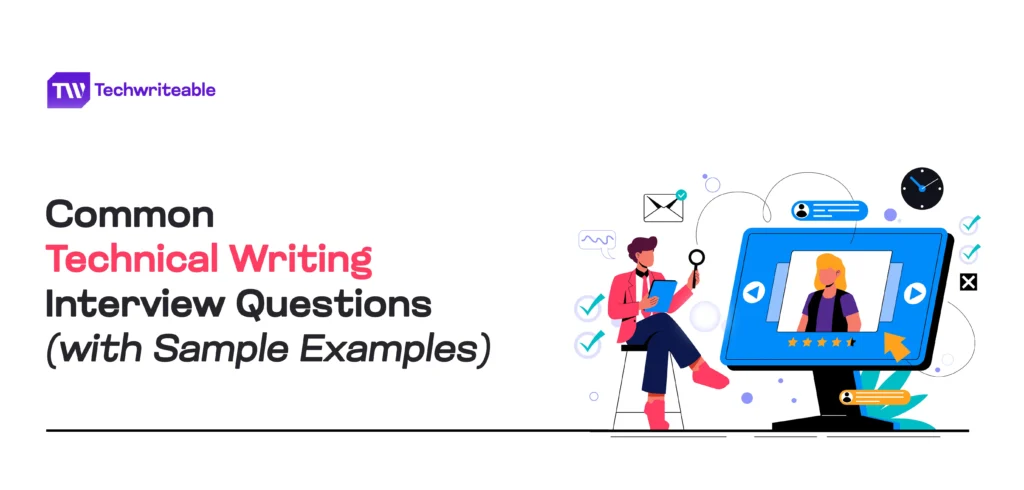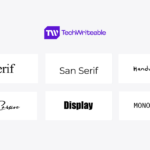Recent statistics from the U.S. BUREAU OF LABOR STATISTICS projected technical writers’ employment to grow 7 percent from 2022 to 2032. This growth is said to be faster than the average for all occupations and indicates the increasing demand and significance of this role.
Technical writing interviews aim to evaluate a candidate’s ability to communicate complex information in a clear, concise, and accessible manner. These interviews are crucial because they help employers determine whether a candidate possesses the necessary skills to document and explain technical products and processes. Preparing for these interviews is vital as it allows you to demonstrate your understanding of technical writing principles, showcase your ability to handle typical job challenges, and express your passion for the field.
In this article, we have provided common technical writing interview questions that could come your way, and how you can answer them.
Understanding the Role
A technical writer’s primary responsibility is to create documentation that helps users understand and use a product or service. This documentation can include manuals, help guides, online articles, FAQs, and more. A technical writer researches and gathers information, understands user needs, organizes content logically, writes clearly and concisely, and edits and revises content based on feedback.
To be successful in technical writing, you need several skills. These include excellent written communication, the ability to understand and explain complex concepts, attention to detail, proficiency in technical writing tools and software, and strong research and analytical skills. Additionally, being able to work collaboratively with subject matter experts and other team members is crucial to producing accurate and useful documentation.
Types of Technical Writing Questions
In a technical writing interview, you can expect three main types of questions: general, technical, and behavioral.
- General questions focus on your background, experience, and understanding of technical writing. These questions help the interviewer assess your overall fit for the role and your motivation for applying.
- Technical questions delve into your knowledge of specific tools, techniques, and processes used in technical writing. These questions evaluate your ability to perform the essential duties of the job effectively.
- Behavioral questions aim to understand how you have handled various situations in the past, such as meeting deadlines, resolving conflicts, and collaborating with teams. These questions also aim to predict how you might perform in similar situations in the future.
In preparing for these questions, you should be ready to discuss your experiences, demonstrate your technical knowledge, and reflect on your behavior in different work scenarios.
Common General Questions
1. What interests you about technical writing?
- Sample answer: “I like technical writing because it combines my love for technology with my passion for writing. I enjoy making complex information easy to understand and helping others learn how to use products or services effectively.”
2. Can you describe your writing process?
- Sample answer: “First, I gather all the necessary information by researching and asking questions. Then, I organize my thoughts and plan the structure of the document. Next, I write the first draft, focusing on clarity and accuracy. Finally, I revise and edit the text to make sure it is clear, concise, and free of errors.”
3. How do you handle tight deadlines and multiple projects?
- Sample answer: “I prioritize tasks based on their deadlines and importance. I also break down larger projects into manageable parts and set mini-deadlines for each part. This way, I can stay organized and ensure that I meet all my deadlines without compromising the quality of my work.”
4. How do you ensure the technical accuracy of your documents?
- Sample answer: “I always double-check my facts and figures and consult with subject matter experts when necessary. I also use reliable sources for my research and keep up-to-date with the latest trends and developments in the field to ensure accuracy.”
5. Can you give an example of a challenging project you worked on and how you handled it?
- Sample answer: “Once, I had to write a user manual for a complex software application in a very short time. To handle this, I quickly familiarized myself with the software by using it and talking to the developers. Then, I focused on writing clear, step-by-step instructions. I managed my time effectively and worked extra hours to meet the deadline without sacrificing quality.”
Common Technical Questions
Here are five common technical questions often asked in technical writing interviews, with sample answers in simple English:
1. What tools and software are you familiar with for technical writing?
- Sample answer: “I have experience using a variety of tools for technical writing, including Microsoft Word for document creation, Adobe Acrobat for PDF management, and MadCap Flare for help documentation. I also know how to use image editing tools like Snagit to create and edit screenshots.”
2. How do you manage version control for your documents?
- Sample answer: “I use version control systems like Git to track changes in documents over time. This way, I can keep a history of edits and collaborate with others more effectively. I make sure to commit changes regularly and use clear, descriptive messages for each commit.”
3. Can you explain the difference between active and passive voice and when you would use each in technical writing?
- Sample answer: “Active voice is when the subject of the sentence performs the action, like ‘The technician installed the software.’ Passive voice is when the subject is the recipient of the action, like ‘The software was installed by the technician.’ In technical writing, I use active voice to make instructions clearer and more direct, but sometimes I use passive voice when the doer of the action is unknown or irrelevant.”
4. What steps do you take to ensure your documentation is user-friendly?
- Sample answer: “I focus on understanding the audience’s needs and knowledge level first. Then, I use clear and simple language, include helpful visuals, and organize the content logically. I also make sure to test the documentation with real users when possible to get feedback and make improvements.”
5. How do you handle technical information that you are not familiar with?
- Sample answer: “When I encounter technical information I’m not familiar with, I start by doing thorough research to understand the topic. I consult with subject matter experts, look for reliable sources online, and study existing documentation. This helps me write accurate and informative content even on new or complex topics.”
Common Behavioral Questions
1. Describe a time when you had to adapt quickly to a change in priorities.
- Sample Answer: “When the COVID-19 pandemic started, my IT team had to enable remote work for all employees quickly. I helped reprioritize tasks, setting up necessary technologies swiftly to ensure a smooth transition to teleworking.”
2. Can you tell me about a time when you failed on the job?
- Sample Answer: “In my first job, I misjudged the time needed for a project and missed the deadline. I took responsibility, communicated with the client, and learned to estimate time for future projects better.”
3. Tell me about a time when you led a team.
- Sample Answer: “I led the transition to a new order management system, coordinating multiple teams and ensuring everything was completed on schedule, demonstrating my ability to manage complex projects successfully.”
4. Describe a time when you had to deal with an upset customer.
- Sample Answer: “A loyal customer was upset with a product issue. I remained calm, understood their concern, and went beyond the policy to provide a satisfactory solution, maintaining their loyalty to the company.”
5. How do you approach goal-setting?
- Sample Answer: “I align my goals with organizational priorities using the SMART criteria, breaking down large goals into actionable steps to track progress and ensure success.”
Wrapping Up
Successfully navigating technical writing interviews requires understanding the role, preparing thoroughly, and showcasing your skills effectively.



